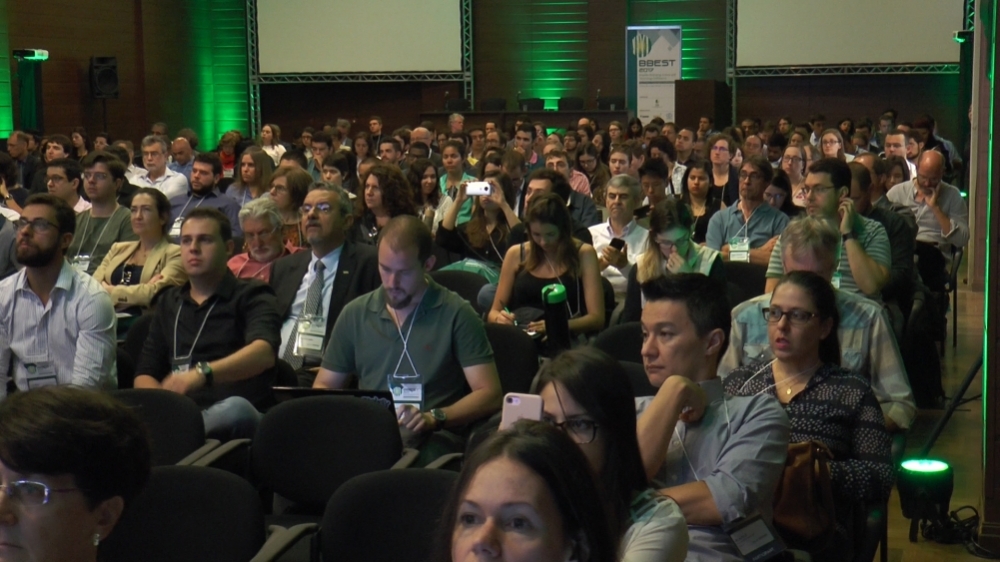

Discussion focused on directions in bioeconomy during the opening of the third Brazilian BioEnergy Science & Technology Conference (photo: BBEST)
Discussion focused on directions in bioeconomy during the opening of the third Brazilian BioEnergy Science & Technology Conference (BBEST).
Discussion focused on directions in bioeconomy during the opening of the third Brazilian BioEnergy Science & Technology Conference (BBEST).

Discussion focused on directions in bioeconomy during the opening of the third Brazilian BioEnergy Science & Technology Conference (photo: BBEST)
By Karina Toledo, in Campos do Jordão (Brazil) | Agência FAPESP – Experts forecast that initiatives in different sectors will be required to reduce greenhouse gas emissions, keep global warming below 2 °C until the end of the century, and minimize the impact of climate change on humans. According to Carlos Henrique de Brito Cruz, FAPESP’s Scientific Director, bioenergy has a guaranteed role to play in this set of solutions.
Brito Cruz made the statement while delivering the opening address of the third Brazilian BioEnergy Science & Technology Conference (BBEST), which was held in Campos de Jordão, Brazil, on October 17-19. Organized under the aegis of the FAPESP Bioenergy Research Program (BIOEN), the event discussed bioenergy in the context of the bioeconomy and its links to industrial innovation and sustainable development.
“Energy is essential to development. In the coming years, China, India, Russia and Brazil, as well as countries in Africa and the Middle East, will need more energy to create a better life for their people,” Brito Cruz said. “This only augments the challenge of containing emissions. We will need to find ways of tackling this problem.”
He went on to say that bioenergy can most strongly mitigate the greenhouse gas emissions from transportation, the sector that currently consumes the most energy in the world today (27% of the total).
For Brito Cruz, the idea that electric cars will totally replace cars with internal combustion engines should be taken with a grain of salt. The automotive industry has yet to surmount the obstacle of raising the energy density of batteries enough to give battery-powered cars sufficient ranges between charges.
“The convenience of using liquid fuel is significant. The combustion engine can be made smaller and more efficient. Electricity and biofuels are complementary solutions and will have to work together. Future demands for biofuels will be associated mainly with aviation, ocean shipping, and long-distance overland travel,” he said.
Renewables are increasing their share of the energy balance in almost all countries. In New Zealand, Sweden, Norway and Iceland, they already account for over 40%.
“Their share is 41% in Brazil. Few countries can reach that level,” Brito Cruz said. “Our main renewable is sugarcane, which meets 17.2% of the demand. Almost 9% of the electricity generated in Brazil comes from biomass burning today. This shows the importance of bioenergy in many sectors besides transportation.”
Designing a Sustainable Bioeconomy
Addressing the opening ceremony of BBEST 2017, FAPESP President José Goldemberg emphasized that, by 2050, bioenergy will account for almost 30% of all energy used worldwide, up from approximately 10% at present, according to the International Energy Agency (IEA), an autonomous intergovernmental organization established within the framework of the Organization for Economic Co-operation & Development (OECD).
“FAPESP’s awareness of this situation is the reason why it set up BIOEN, which, since its inception in 2008, has received investments amounting to R$80 million,” Goldemberg told Agência FAPESP.
Gláucia Mendes Souza, a professor at the University of São Paulo’s Chemistry Institute (IQ-USP) and a member of BIOEN’s steering committee, said BBEST was born at practically the same time as BIOEN with the aim of building links between academia and industry and seeking to communicate progress in science and technology to formulators of the public policies for the sector.
“Previous editions of BBEST showed how bioenergy can interact with issues such as food security, environmental security, climate security and sustainable development,” she said. “In the last three years, we’ve begun thinking about all these issues in a more integrated way, pursuing the development of a bioeconomy. Through BIOEN, we’re developing technologies to use biomass and to make many other things besides bioethanol, such as aviation fuel and bioproducts to replace those now produced by the petrochemical industry.”
For Luuk van der Wielen, the director of the Biotechnology based Ecologically Balanced Sustainable Industrial Consortium (BE-Basic) and co-chair of BBEST (alongside Mendes Souza), the bioeconomy offers a solution to Brazil’s current turbulence and economic difficulties. “There are many initiatives of this kind, and they’ll be displayed during these three days,” he said.
The opening ceremony also featured Heitor Cantarella, a researcher at the Agronomy Institute (IAC), and Marcio de Castro Silva Filho from the Luiz de Queiroz College of Agriculture (ESALQ-USP), the joint general secretaries of BBEST 2017.
For more information about BBEST: bbest.org.br.
Republish
The Agency FAPESP licenses news via Creative Commons (CC-BY-NC-ND) so that they can be republished free of charge and in a simple way by other digital or printed vehicles. Agência FAPESP must be credited as the source of the content being republished and the name of the reporter (if any) must be attributed. Using the HMTL button below allows compliance with these rules, detailed in Digital Republishing Policy FAPESP.




